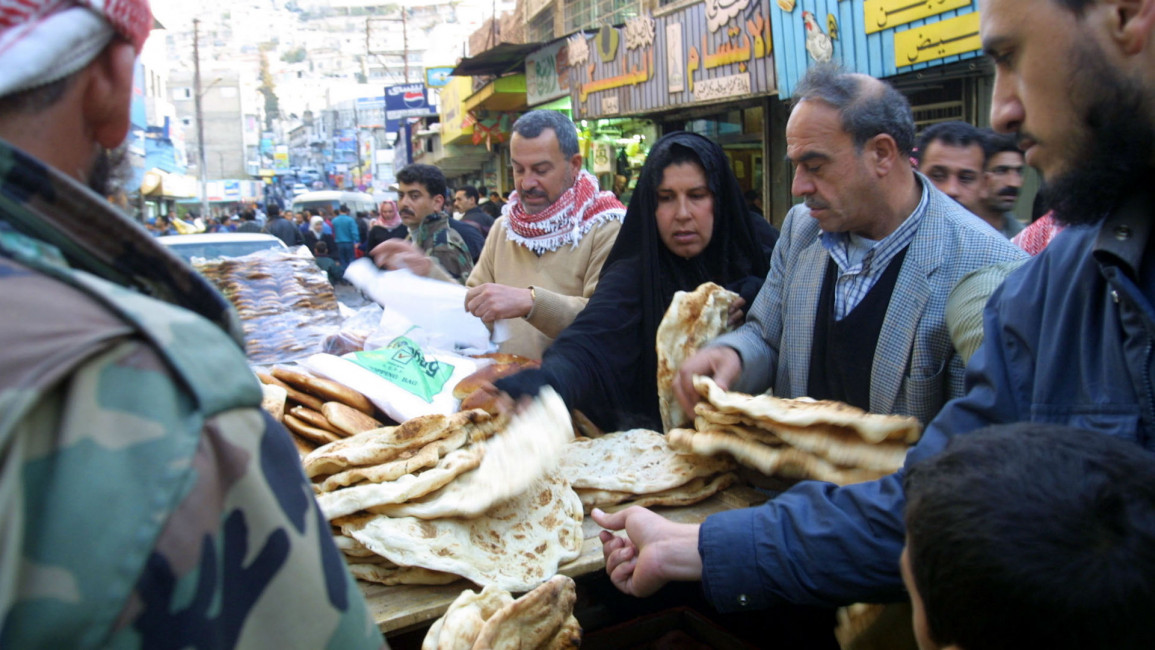
What happened to Jordan's bread price protests?
Rallies, sit-ins and other forms of public mobilisation against Trump's decision continued in several Jordanian cities throughout January, and passed off without tension or confrontation with the police.
In contrast, Jordan's government announced in late January that it would impose a new pricing scheme for bread, whereby subsidies historically provided by the government will be removed.
The changes - effective as of beginning of February - came as part of ongoing governmental policies to gradually withdraw state subsidy support and generate additional income for the state budget.
Since then, a few protests have erupted, albeit on a low scale, in several parts of the country.
Notably, the scope and scale of the two sets of protests varied tremendously. The Jerusalem protests were evidently much bigger than those related to public rejection of the government's economic policies.
But the reasons behind such a difference, and consequently the immediate outlook for economically and politically driven protests in Jordan, appear clear.
Jordan does not seem to be witnessing protests on a scale that could be compared to the events that led to the Syrian uprising in 2011, or even similar to the lower-scale mobilisation that Jordanian cities experienced during the Arab Spring.
 |
Rising bread prices should not be seen as the tip of the iceberg; Jordanian society reached that point some time ago |  |
Firstly, the protests and rallies in solidarity with Jerusalem - as well-founded as they are - should not be taken as hard evidence of the vibrancy of civic mobilisation in the country.
As an indicator of public opinion, those protests were problematic in that they took place at a time when Trump's decision had infuriated the ruling establishment in the country. It would be legitimate to conclude that these rallies were in fact, exactly what the government wanted at that time.
Indeed, top officials openly called on the public to rally in support of the Jerusalem cause, including the deputy prime minister in early December last year.
Secondly, the Jordanian government's economic policies have continued to take an alarming direction over the past few years. The government has reached major milestones such as the removal of electricity subsidies - causing a huge increase in prices - without real public challenge or pressure.
Read more: Cutting bread subsidies could make Jordan the next Syria
In other words, rising bread prices should not be seen as the tip of the iceberg; Jordanian society reached that point some time ago.
Instead, at the heart of the matter is the issue of Jordan's restricted political space which has effectively declined, and is on its way to evaporating completely.
Twitter Post
|
Not only was there a poor turnout at what should have been mass demonstrations against recent bread price decisions, but the government also banned several planned protests and rallies (while it happily encouraged people to rally in support for Jerusalem).
Freedom of assembly is largely restricted in Jordan where public meetings and marches represent the "exception" and not the norm.
Aside also from the pressing issues of the absence of any real opposition in Jordan, as well as the lack of political leadership to spearhead public demands; organise and plan them effectively; the demographic factor plays a crucial role in determining the shape of public reaction to government policies.
While protests over economic policies have notably taken place in southern part of the country (usually referred to as less-economically-advantaged) and on some other occasions in central Jordan cities; the best barometer is to assess how the capital Amman is influenced by them; and currently, is not.
Concretely, the Jordanian government is not acting on "potential" social unrest over its economic policies. In fact, reproducing the image Syria's destruction post the 2011 uprising, as an imminent consequence of widespread social mobilisation against the government's policies, is no doubt a broken cliché.
We have seen it countless times, when regimes are in the business of suppressing opponents, restricting political debate and monopolising power (both economic and political). There is no reason not to think that Jordan's government is in the same position, too.
 |
Top officials openly called on the public to rally in support of the Jerusalem cause |  |
Ironically, criticism of government policies is still happening on social media. But this unconventional space remains rather one-dimensional in terms of offering concrete change, or bringing real accountability.
If this online space is all that's left to the public in Jordan, we should be very concerned about an environment in which people cannot physically engage in independent civic activity, instead growing helplessly isolated.
Lastly, the current limited debate about future of the protests in Jordan, should recognise the growing influence of the elites in the political, economic and social spheres.
Jordan is not an oligarchy-free country, and it appears to be deconstructing the means people can use to dissent, challenge, oppose and hold officials accountable.
Fadi Al-Qadi is Amman-based Middle East and North Africa human rights, civil society and media commentator.
Follow him on Twitter: @fqadi
Opinions expressed in this article remain those of the author and do not necessarily represent those of The New Arab, its editorial board or staff.



